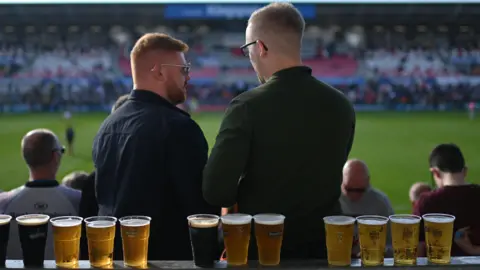In a significant move toward re-evaluating the longstanding drinking restrictions at football matches, MP Luke Charters, representing York Outer, has urged for a contemporary approach to the alcohol ban imposed on spectators within view of the pitch. This discussion arises against the backdrop of a 1985 legislation, which was introduced as part of efforts to combat hooliganism prevalent in the sport at that time. However, this law has led to a peculiar situation where fans of other sports, such as rugby and cricket, are allowed to enjoy a drink while watching their teams, highlighting a growing disparity that Charters believes needs addressing.
The overarching theme of Charters’ argument is the necessity for trials aimed at scrutinizing the potential impact of lifting these restrictions. He emphasized, “It’s been 40 years since alcohol was banned in view of the pitch,” advocating that the game has evolved and so should the rules surrounding it. By contrasting the practices of European countries, notably Germany and Italy, where fans can freely enjoy alcoholic beverages while supporting their teams, Charters posits that a shift in approach is both necessary and overdue. He recognizes, however, that this change may not be universally applicable, particularly in family areas where it may not be suitable.
The Football Supporters Association (FSA) has voiced strong support for Charters’ proposal, suggesting that it not only makes sense to reevaluate the ban but that clubs have previously called for such changes. The FSA representative stated the organization would welcome trials in men’s football, reinforcing the notion that the current restrictions may not align with today’s football culture.
In a progressive step, a trial allowing alcohol consumption in view of the pitch has already been conducted in the women’s game, which is not constrained by the 1985 ban. Clubs like Bristol City, Southampton, Birmingham City, and Newcastle United participated in this initiative during selected matches, reflecting a growing willingness within the sport to offer fans more choices while balancing safety concerns. Nikki Doucet, the chief executive of Women’s Professional Leagues Limited (WPLL), expressed support for this initiative, stressing the importance of providing fans with options while ensuring a responsible environment.
Charters suggests implementing small-scale trials in the men’s game to ascertain what might be beneficial moving forward, particularly in lower leagues. “Limited trials and conversations are really what I am talking about,” he said, indicating that the focus should be on responsibly allowing fans who wish to drink the opportunity to do so without compromising matchday safety.
The former English Football League (EFL) chief executive Shaun Harvey previously noted the ban as “disproportionate,” further underscoring the ongoing debate around the restrictions and the need for reform. Charters raised this issue during a House of Commons debate on the Football Governance Bill, also advocating for the expansion of the Premier League ticket price cap to include all top five leagues, thus encompassing broader fan interests.
Overall, Charters’ plea for reconsideration of the alcohol ban at football matches encapsulates a desire for modernization within the sport, recognizing the evolving nature of society and its relationship with alcohol consumption in sporting environments. The anticipated trials and discussions could pave the way for a more inclusive atmosphere for fans, where supporting their teams includes the option to enjoy a beverage responsibly. With the backing of organizations like the FSA and the positive outcomes observed in women’s football, the dialogue surrounding this topic signifies a transformative moment poised to reshape the spectator experience in England’s football culture.



